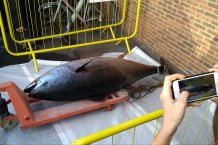Articles

Atlantic bluefin tuna dissected by university scientists
Tuna dissected by university scientists
A tuna accidentally caught off Devon has been dissected by scientists at the University of Exeter.
The 2.3 metre Atlantic bluefin tuna was landed by a fisherman off Brixham.
As catching and selling bluefin tuna is prohibited in the UK, it was handed to Exeter researchers via the marine science organisation Cefas and the Marine Management Organisation, the fisheries regulator for English waters.
“This is an endangered species, so we want to learn as much as we can from this individual,” said Dr Lucy Hawkes, of the University of Exeter.
“The eye lenses have layers like an onion, and tests on these can reveal a ‘geographical signature’ showing where the tuna has been through its life.
“Its ear bones will allow us to estimate its age, muscle samples will give us information about genetics and we can look for heavy metals and other toxic chemicals which often stick to fats.
“We will also look in its guts to see if it has ingested plastic, as many marine creatures do.”
The scientists had to improvise to carry out the dissection at the university’s Streatham Campus, as this was the first bluefin tuna to be captured off the south coast of Devon. Dissections of large marine animals more commonly occur at the University’s Penryn Campus.
“We have all the kit in Penryn, but for this job I brought a kitchen knife from home and we had to stop at B&Q for overalls and a saw,” said Dr Hawkes.
“I think the staff there were a bit alarmed when we said we were going to cut up a body – but we explained it was a big fish!”
Dr Hawkes said fishermen at Brixham were very helpful, and were fascinated about what the scientists would do with the tuna.
With more bluefin tuna being spotted in British waters, the researchers expect more to be accidentally caught in the future.
Dr Matthew Witt, from the University’s Biosciences Department at Hatherly Laboratories in Exeter and the Environment and Sustainability Institute on the Penryn Campus, said: “Numbers dwindled in UK waters in the late 20th Century, possibly due to fishing, but in the last five years more have been seen off our coasts.
“The species might be recovering, but it’s also possible that populations are simply moving and that’s why we’re seeing more here.”
Exeter and Cefas scientists are hoping to attach satellite tags to bluefin tuna in the future to discover more information about their movements.
Date: 8 December 2017
